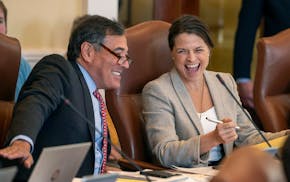BANGKOK — Police in Thailand have opened investigations of four people for allegedly causing panic by posting rumors of a possible military coup on Facebook — and an investigator threatened Monday to charge anyone who even "liked" the postings on the social media site.
The move comes as Bangkok braces for possible political protests this week coinciding with a bill related to a 2006 coup in the country. Opponents say the bill could pave the way for the return of the man that the military ousted in that takeover, former Prime Minister Thaksin Shinawatra, whose sister leads the current elected government.
Technology Crime Suppression division chief Police Maj. Gen. Pisit Paoin said Monday that the four posted Facebook entries with false information that could damage the country. If found guilty, they could face up to five years in prison and a fine worth 100,000 baht ($3,200).
"These four have posted false messages about the coup and other messages that could lead to chaos in the society," Pisit told at a press conference. "The postings' content does not hold any truth, and if the words kept spreading around, it could damage to the country." He said the police have issued summons for them to meet investigators.
Among those summoned are Sermsuk Kasitipradit, the political editor of public television channel TPBS, and a local pro-government protest leader.
The postings mentioned a possibility of a military coup and urged the public to hoard food and water.
"Those who 'liked' and 'shared' the posts will also face charges, so we would like to ask the public to contemplate very carefully about the way they use social media," Pisit added.
More than 1,000 anti-government protesters kicked off a rally in Bangkok on Sunday as lawmakers were scheduled to deliberate on the controversial bill on Wednesday.
Last week, the government invoked the Internal Security Act in three Bangkok districts, citing the possibility of protest violence. The act, in effect from Aug. 1 - 10, authorizes officials to seal off roads, take action against security threats, impose curfews and ban the use of electronic devices in designated areas. Peaceful and unarmed rallies are allowed under the law.
Opponents of Prime Minister Yingluck Shinawatra's government feared the bill, which would grant amnesty to people arrested for political activities since the 2006 military coup, could pave the way for the return of her brother Thaksin.
Thaksin was ousted in the 2006 coup and has been living in self-imposed exile.
The government's special peace-keeping command under the Internal Security Act warned on Sunday against sharing any information that could lead to havoc in the nation.
Army chief Gen. Prayuth Chan-ocha on Monday denied the coup rumors and urged the public to be careful in distinguishing truth from rumors.
"Do not spread the rumors. Rumors are rumors. I want every group, every side, everyone, no matter which side you're on, to be sensible ... and be able to see what is true and what isn't," Prayuth told reporters.
Thailand's 2007 Computer Crime Act addresses hacking and other traditional online offenses, but also bars the circulation of material deemed detrimental to national security or that causes panic. It carries a penalty of up to five years' imprisonment and a fine of 100,000 baht ($3,300).

Biden scores endorsements from Kennedy family, looking to shore up support against Trump and RFK Jr.
The Latest | Seated juror in hush money trial excused as prosecutors ask judge to sanction Trump
Former Wisconsin Democratic Rep. Peter Barca announces new bid for Congress

